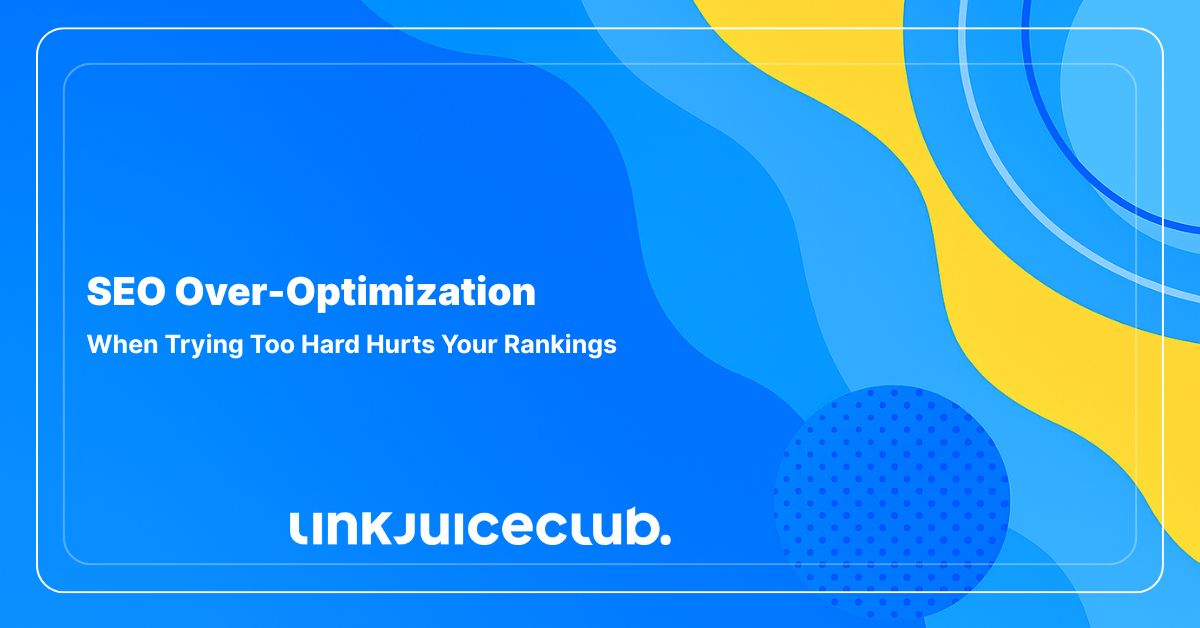
SEO Over-Optimization: When Trying Too Hard Hurts Your Rankings
We all love a little optimization. Fine-tuning content, tightening up metadata, slipping in those tasty internal links. This is all part of the SEO game.
But here’s the thing: sometimes, in the hustle to please the algorithm, you end up doing too much.
This is the case of SEO over-optimization, the digital equivalent of trying too hard on a first date. At first glance, everything looks perfect. But scratch the surface, and it’s awkward, forced, and just a little bit… off.
Google sees it too. Whether you’re keyword stuffing like it’s 2006 or over-engineering every sentence into a robotic mess, Google might actively penalize you for it.

So yes, optimization is good. But is SEO over-optimization? That’s where good content goes to die.
What Over-Optimization Really Looks Like
Let’s break down two of the most common ways SEO over-optimization goes off the rails.
Keyword Stuffing: When Relevance Becomes Redundant
Keyword targeting? Good. Keyword stuffing? Google’s version of nails on a chalkboard. This happens when you repeat your target keyword (and every variation of it) like a broken record until your content starts sounding like it was written by a very enthusiastic, very confused robot.
Example? Here’s one that hurts to read:
Looking for the best noise-cancelling headphones? Our guide to the best noise-cancelling headphones reviews the top noise-cancelling headphones for travel and the best-rated noise-cancelling headphones for flights.
We get it. You want to rank. But this is not how. Modern SEO isn’t about brute-forcing phrases; it’s about context, clarity, and answering real questions. If you write naturally and thoroughly about your topic, the keywords will flow in on their own.
So yes, use keywords smartly, especially in your headings, meta titles, and intro. But don’t turn your blog into a spam sandwich. Because SEO over-optimization like this does the opposite of what you want: it sends your rankings into the void. 💣
Anchor Text Overkill: Let the Links Breathe
If all your backlinks are using the same keyword as anchor text, Google starts smelling something fishy. Like, maybe those links weren’t exactly earned. Maybe they were arranged.
A healthy link profile is a mix. Some exact-match, some branded, some naked URLs, some random click here types. Trying to force exact-match anchors everywhere is classic SEO over-optimization.
It doesn’t just look suspicious; it is suspicious.
Here’s the better strategy: stop obsessing over how people link to you. Focus instead on why they’re linking to you. If the content is good, if the value is clear, and if your site is link-worthy, the rest takes care of itself. 💣
The Other Kind of SEO Over-Optimization: Wasting Time on Tiny Gain
Not all SEO over-optimization is about keyword stuffing or link spamming. Sometimes, it’s just plain overkill, spending hours chasing microscopic improvements that barely do anything.
Sure, attention to detail is great, but if you’re stuck polishing things no one sees or stressing over changes that bring zero real value… you’re just burning time.
Rewriting Every Meta Tag Like Your Life Depends on It
Yes, titles and meta descriptions matter. They help you stand out in search results and can boost your click-through rate.
But if you’re obsessively tweaking tags on pages that barely get traffic, you’re solving a problem that doesn’t exist. Focus on the pages that do perform. Prioritize. Don’t bother yourself with meta details that live in SEO no-man’s land. 💥
Chasing Core Web Vitals Like It’s the Olympics
Speed is important, and so is giving users a smooth experience. But trying to make your site load a tiny bit faster, like shaving off 0.3 seconds, won’t make a big difference if it’s already performing well. If your Core Web Vitals score is in the red, yes, fix it. But once it’s in the green? Don’t stress over every millisecond! 💥
Fixing Redirect Chains That Aren’t Even Broken
Redirect chains can cause problems, but only when they get too long. If you’re stressing over every little 3-step redirect, you’re overthinking it. Google can handle up to 10 without blinking. If things are getting out of hand, sure, clean them up. Just don’t treat every small redirect like it’s a major issue. 💥
Know When to Optimize (But, Please, Also Know When to Let It GO)
SEO is all about improvement, but there’s a fine line between refining and overdoing it.
When you start tweaking every title tag on low-traffic pages or chasing perfect scores on Core Web Vitals just to gain a fraction of a second, you’re not optimizing anymore, you’re just wasting time.
The key to avoiding SEO over-optimization is to know where your effort actually pays off. Tackle the stuff that matters, ignore the noise, and keep your focus on creating real value.





